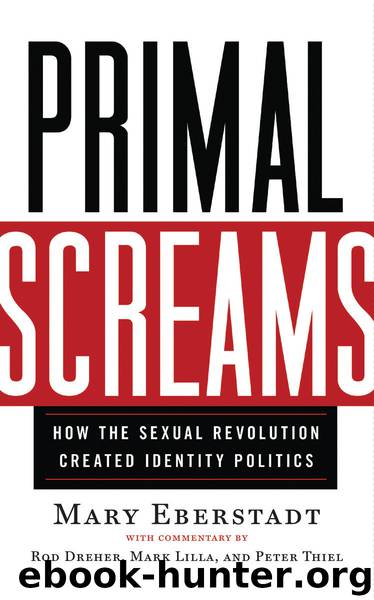Primal Screams by Mary Eberstadt

Author:Mary Eberstadt
Language: eng
Format: epub
Publisher: Templeton Press
And men?
For a different set of reasons, there is increased pressure in a postrevolutionary age not to act like men and to lean in toward the potentially more rewarding feminine side instead.
In 1999, biological anthropologist Lionel Tiger published a book called The Decline of Males: The First Look at an Unexpected New World for Men and Women.20 He argued that contemporary feminism and legalized abortion rendered men less effective and less necessary than ever before. In a world where men have little legal or social say in the important matters of fatherhood and marriage, Tiger suggested, a great many might get the notion: why bother? The years since then seem to have vindicated his thesis in full, with “Peter Pan syndrome,” video-gaming boys downstairs, “failure to launch,” and other pop manifestations of the phenomenon he described. These forms of male retreat, too, have parallels elsewhere in the world, including in the hikikomori of Japan (boys who refuse to leave the basement and/or join society)21 and the related “new hermits” of Korea.22
At the same time, these developments have illuminated another key point. Traditional masculinity is not only unwanted by many people in a postrevolutionary world where women now control (if they want to) the literal means of (re)production. Masculinity and men are also objects of new denigration, as the popular phrase “toxic masculinity,” among other signposts, reveals.23 The same stigmatization is also inadvertently responsible in part for the global embrace of Jordan B. Peterson’s work by young men, especially; as psychologists would say, his affirmative writing gives them “permission” to be masculine at a time when masculinity is deemed déclassé and worse by nouveau tastemakers.24
The animosity toward masculinity doesn’t spring from nowhere. Masculinity is in part taught—and as Tupac Shakur so plaintively pointed out, in an age when half of children don’t have fathers, who will teach it? This brings us to another pressing (albeit resolutely unattended) phenomenon that increases the penalty for masculinity: the psychologically untenable situation in which many boys are caught, postrevolution.
As noted, some children today are born to unmarried women; and whether their parents ever married or not, many will not grow up with their biological father present in the home. That much is familiar sociology.
But these same homes are not only missing a male adult. They are also, often enough, homes in which the absent male parent is openly resented—in which the mother is regarded (understandably so) as a heroic figure for doing as one human what ought to be the work of two. Unavoidably, in many such families, the notion that men are unreliable is not an abstract feminist prejudice, but a fact of life.
What kind of message is received, however unconsciously, by the male children growing up in such homes? It is the lesson that men are bad.
How could those domestic atmospherics do anything but complicate a young man’s effort to answer the question Who am I? Hillary Clinton and other self-described feminists are fond of invoking the slogan, “The future is feminine.” The social reality is that this is no mere campaign message.
Download
This site does not store any files on its server. We only index and link to content provided by other sites. Please contact the content providers to delete copyright contents if any and email us, we'll remove relevant links or contents immediately.
The Secret History by Donna Tartt(16721)
The Social Justice Warrior Handbook by Lisa De Pasquale(11506)
Thirteen Reasons Why by Jay Asher(7833)
This Is How You Lose Her by Junot Diaz(5829)
Weapons of Math Destruction by Cathy O'Neil(5080)
Zero to One by Peter Thiel(4867)
The Myth of the Strong Leader by Archie Brown(4809)
Promise Me, Dad by Joe Biden(4478)
Beartown by Fredrik Backman(4464)
How Democracies Die by Steven Levitsky & Daniel Ziblatt(4447)
Stone's Rules by Roger Stone(4438)
The Fire Next Time by James Baldwin(4373)
100 Deadly Skills by Clint Emerson(4107)
A Higher Loyalty: Truth, Lies, and Leadership by James Comey(4059)
Rise and Kill First by Ronen Bergman(4044)
The David Icke Guide to the Global Conspiracy (and how to end it) by David Icke(3913)
The Farm by Tom Rob Smith(3894)
Secrecy World by Jake Bernstein(3807)
The Doomsday Machine by Daniel Ellsberg(3758)
